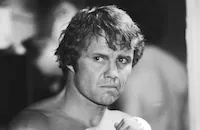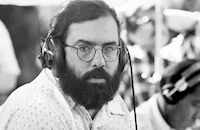John Grisham's The Rainmaker
Brief Synopsis
Cast & Crew
Francis Ford Coppola
Matt Damon
Danny De Vito
Claire Danes
Jon Voight
Mickey Rourke
Film Details
Technical Specs
Synopsis
Struggling new attorney Rudy Baylor resorts to working for a shady lawyer, where he meets paralegal Deck Shifflet. When the insurance company of Dot Black refuses her dying son coverage, Baylor and Shifflet team up to fight the corrupt corporation, taking on its callous lawyer. Meanwhile, Baylor becomes involved with Kelly Riker, an abused wife, whose husband complicates matters when he confronts Baylor.
Cast

Matt Damon

Danny De Vito
Claire Danes

Jon Voight
Mickey Rourke

Roy Scheider
Andrew Shue
Melissa Hurst
Terrance Stewart
Donald Folden
Daniel O'callaghan
Rodney Peck
Deborah Frazier
Mike Cody
Red West
Alan Woolf
Anasa Briggs-graves
John Gray
Johnetta Shearer
Pamela Tice Chapman
Alex Harvey
Sonny Shroyer
Sherry Sanford
Lynn Carthane
Adrian Roberts

Dean Stockwell
Warren Luening
Frank Clem
Justin Ashforth
Bill Lunn
Michael Keys Hall

Teresa Wright
Mary Kay Place
Johnny Whitworth
Ronnie Dee Blair
Eloise Dukes
Randall King
Christopher Gray
Vernon Newman
Nate Bynum
Tammy Wendel
Mike Lang
Bridget Brunner
Trula Marcus
Verda Davenport
Katherine Morrow
James Cunningham
Randy Travis
James W Redmond
Virginia Madsen
Mary Lester
Wayne Emmons
Billy Ray Reynolds
Tom Kagy
John Yancey
Tony Dingman
Michael Girardin
Crew
Michael Amundson
Kim Aubry
Paul Babin
Bob Baron
Mark Berger
Elmer Bernstein
Elmer Bernstein
David Betancourt
Katherine E Beyda
Katherine E Beyda
Eddie Boyd
Lois Burwell
Kim B Christensen
Guy Clayton
David A. Cohen
Francis Ford Coppola
Francis Ford Coppola
Howard Cummings
Jimmie Davis
Tony Dingman
Michael Douglas
Kathy Durning
Scott Elias
Wayne Emmons
Wayne Emmons
Jane Feather
Dawn Fintor
Wayne Fitzgerald
Michael Floquet
Laura Folger
Clare Freeman
Fred Fuchs
Jack Gill
Danny Glover
Reuben Goldberg
John Grisham
John Grisham
Kenneth Haber
Lauren Hallinan
Patrick Hallinan
Slim Harpo
Barbara Harris
Michael Herr
Larry Hoki
Georgia Kacandes
Georgia Kacandes
David Kelley
Melissa Kent
B. B. King
Michael Kirchberger
Bruce Lacey
Mark Levinson
Bill Lunn
Barry Malkin
Gary Marcus
Gary Marcus
Brick Mason
Polly Ann Mattson
Eugene Mccarthy
Dave Mcdonald
Jeffrey D Mcdonald
Charles Mitchell
James Moore
Barbara Munch
Scott P. Murphy
Doug Murray
Anahid Nazarian
Davia Nelson
Tim O'shea
E Larry Oatfield
Leslie Park
Linda Phillips-palo
Joseph Piantadosi
Steven Reuther
Matt Robertson
Aggie Guerard Rodgers
Arturo Rojas
Fred Roos
Michael Semanick
Bob Shaw
David Sousa
Alicia M Stevenson
Dianna Stirpe
Nelson Stroll
Laura Tateischi
John Toll
John Toll
T-bone Walker
Dan Wallin
Jennifer Ware
Don Was
Buddy Waters
Winnie Brown Willis
Robert Yeoman
Robert Yeoman
Paul Zydel
Film Details
Technical Specs
Articles
Teresa Wright (1918-2005)
She was born Muriel Teresa Wright in New York City on October 27, 1918. She showed a keen interest in acting in grade school, and by the time she was 19, she made her Broadway debut in Thorton Wilder's Our Town (1938); the following year she scored a hit as Mary, the weeping ingénue in Life with Father (1939). The word was out that New York had a superb young acting talent on hand, and Samuel Goldwyn soon brought her to Hollywood for William Wyler's adaptation of Lillian Hellman's The Little Foxes (1941). She scored an Oscar® nomination for her film debut as Regina Giddens' (Bette Davis), honorable daughter, Alexandria.
She maintained her amazing momentum by scoring two Oscar® nominations the following year for her next two films: as Carol Miniver in Wyler's Mrs. Miniver (Best Supporting Actress Category), and as Lou Gehrig's (Gary Cooper) faithful wife Ellie in Pride of the Yankees (Best Actress Category), and won the Oscar for Miniver. Yet for most fans of Wright's work, her finest hour remains her perfectly modulated performance as young Charlie in Alfred Hitchcock's masterpiece, Shadow of a Doubt (1943). Wright's performance as the self-effacing, impressionable young niece who gradually realizes that her beloved uncle (Joseph Cotton) may have murdered several widows is effective since Wright's air of observation, subtly turns from idol gazing, to a watchful air of caution as the facts slowly being to unravel. 60 years on, fans of Hitchcock still acclaim Wright's performance as an integral part of the film's classic status.
She proved her talents in comedy with the delightful Casanova Brown (1944), but then saw her schedule slow down due to domesticity. After she married screenwriter Niven Busch in 1942, she gave birth to son, Niven Jr., in 1944, and took two years off to look after her family. She soon returned to film with another Wyler project, the Oscar®-winning, post war drama, The Best Years of Our Lives (1946), playing Fredric March's level-headed daughter, Peggy, she again took some time off after giving birth to her daughter, Mary in 1947. On her second attempt to return to the big screen, Wright found her popularity on the wane. Her wholesome image was in sharp contrast of the tougher, more modern women in post-war Hollywood, and her stubborn refusal to pose for any swimsuit or cheesecake photos to alter her image led to her release from Sam Goldwyn's contract.
As a freelance actress, Wright still found some good roles, notably as a young widow in the thriller scripted by her husband, in The Capture; and as a faithful fiancée trying to help Marlin Brandon deal with his amputation in Stanley Kramer's The Men (both 1950). Yet within a few years, she was playing middle-aged mothers in film like The Actress (1953), and The Track of the Cat (1954), even though she was still in her early '30s. By the mid-50s she found work in live television, where she could apply her stage training, in a number of acclaimed shows: Playhouse 90, General Electric Theater, Four Star Playhouse, and The United States Steel Hour.
She took a break from acting when she married her second husband, the playwright Robert Anderson in 1959, (she had divorced her first husband, Busch, in 1952) and was out of the public eye for several decades, save for an isolated theater appearance. When she did return, it was intermittent, but she was always worth watching. In James Ivory's Roseland (1977), a portrait of the New York dancehall; she was poignant as a talkative widow obsessed with her late husband; and as an enigmatic old actress in Somewhere in Time, she nearly stole the picture from leads, Christopher Reeve and Jayne Seymour. She was still active in the '90s, appearing a few hit shows: Murder, She Wrote, Picket Fences; and a final film role in John Grisham's The Rainmaker (1997). She is survived by her son, Niven; daughter, Mary; and two grandchildren.
by Michael T. Toole

Teresa Wright (1918-2005)
Quotes
Trivia
Miscellaneous Notes
Released in United States Fall November 21, 1997
Released in United States on Video May 26, 1998
Released in United States February 1998
Released in United States March 1998
Shown at Olso Film Days in Oslo, Norway February 6-12, 1998.
Shown at Dublin Film Festival March 3-12, 1998.
Constellation Films is a financing and distribution company (co-owned by Michael Douglas, Steven Reuther, and Bobo Scriba) that will handle films produced by Douglas/Reuther.
Began shooting October 7, 1996.
Completed shooting February 6, 1997.
Released in United States Fall November 21, 1997
Released in United States on Video May 26, 1998
Released in United States February 1998 (Shown at Olso Film Days in Oslo, Norway February 6-12, 1998.)
Released in United States March 1998 (Shown at Dublin Film Festival March 3-12, 1998.)














